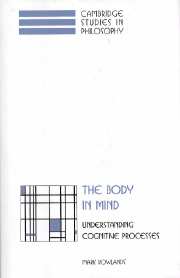Book contents
11 - Environmentalism and teleological semantics
Published online by Cambridge University Press: 03 December 2009
Summary
While providing a simple and elegant solution to the problem of misrepresentation, teleological theories of representation are thought to suffer from the two remaining difficulties that plagued the informational account. Firstly, the teleological account is thought to suffer from a problem of indeterminacy. In the specific context of the teleological theory, this problem takes the following form. Biological function, it is argued, is indeterminate in the sense that in the case of two or more competing interpretations of the function of an adapted biological mechanism, there is often no fact of the matter that could determine which interpretation is the correct one. Therefore, any attempt to ground mental content in biological function seems to entail the indeterminacy of content. The second problem, the problem of intensionality, arises with the teleological theory because, it is argued, statements of biological function are transparent, or extensional, in that a statement of the form ‘the function of evolved mechanism M is to represent Fs’ can be substituted salva veritate by a statement of the form ‘the function of evolved mechanism M is to represent Gs’, provided that the statement ‘F iff G’ is counterfactual supporting. Therefore, statements of biological function are transparent, and any attempt to construct content out of biological function must fail to capture the intensionality of psychological ascriptions.
These problems, as we shall see, are related and often run together. It is, however, useful to distinguish them since, even if one problem does not bother you, the other one might. Dennett (1987), for example, is unperturbed by the problem of indeterminacy, indeed, he embraces the conclusion that mental content is indeterminate.
- Type
- Chapter
- Information
- The Body in MindUnderstanding Cognitive Processes, pp. 230 - 257Publisher: Cambridge University PressPrint publication year: 1999



